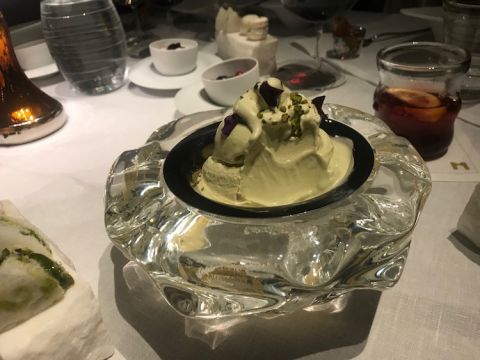The Alajmo brothers Raffaele and Massimiliano are best known for their first restaurant, Le Calandre outside Padua, where in 2004 Max became the youngest three-star Michelin chef at the age of 28. Their latest venture, in Morocco, is their tenth restaurant and their first outside Europe.
After a highly enjoyable dinner at Sesamo, the restaurant that they have just opened in the Royal Mansour Hotel in Marrakech, I sat down with them to discuss how this restaurant had come about.
Missing, however, were two key individuals. The first was the hotel’s general manager, the very French Jean-Claude Messant, and the hotel’s owner, the King of Morocco. The close working relationship between these last two was to see Sesamo open in just under two years, a relatively quick process for an ambitious restaurant in such a prestigious hotel.
The seed for this Italo-Moroccan co-operation was sown 10 years ago, and on another continent. Messant was then the general manager of the Hotel Metropole in Monte Carlo, and was looking for someone to open an exciting restaurant in this hotel. He approached the brothers but they declined (Raf was to tell me that they are inundated with offers from hoteliers around the world, including London). When Messant moved to Marrakech, he tried again.
Raf, the elder brother by six years (52 to Max’s 46) was at first unconvinced, but ultimately he was to change his mind. ‘Why?’ I asked him pointedly. ‘Because Jean-Claude assured me that he had good access to the King and that all decisions would be taken swiftly’, he explained.
This was enough to allow the deal to progress. One of the difficulties many restaurateurs face with opening in hotels is the question of to whom they should report, and who will make the necessary decisions. In most instances the hotel management company is distinct from the owners of the property, slowing down the whole process. Rarely do these two coincide but here it was the exception that proved the rule.
Once a three-year deal had been signed, with a minimum rent payable, the brothers faced up to the challenges of opening a restaurant 2,700 km (1,680 miles) south-west of Padua. All these new challenges existed in a country where language, religion and, most specifically, the ban on the use of alcohol, presented them with additional issues.
‘Wine is a crucial element in Italian cooking, even modern Italian cooking. And even though the alcohol is burnt off during cooking this is still not good enough here’, explained Max.
What has taken the place of alcohol in numerous dishes is Moroccan spices and the addition of essences, of which Max brandished two. As he sprayed one across our table, he imparted a strong hint of orange essence to our espressos.
‘Take that chicken-liver dish with chickpeas (a dish I had heartily enjoyed the previous night). In Italy we would finish the dish with some reduced white wine, but that is impossible here. So I have to add something different but I don’t believe that the absence of the wine takes anything away. In fact, it may even improve it’, Max added with a smile.
We had begun with a couple of dishes that have made Alajmo’s reputation. First of all came his significant improvement on pizza. Max believes that in a traditional oven the centre of the pizza will get cooked but the edges will invariably be burnt. His answer is to steam the pizza base, a process that cooks it evenly, and then to top it in this instance with diced prawns, the quality of which, as with the fish we enjoyed at all the meals during our two-night stay, was excellent.
Risotto, a dish for which I have always seen white wine as an essential ingredient once the rice has been added to the pan, would surely be a crucial test for Max. In this Moroccan instance, it was local saffron that gave the dish a lovely yellow colour, the presence of smoked eel that added texture and a cold beetroot essence, added right at the end of the cooking process, more than compensated.
It was then time for dessert, where very few of these restrictions apply. A sphere of nougat, topped with saffron leaves, sat very prettily on top of a creamy base of orange flower water and bitters. Alongside this dessert, came an extremely heavy clear, glass bowl imported from Italy, full of an all too easy to eat pistachio ice cream.
Certain elements of any top-quality Italian restaurant have been swiftly achieved. The waiting staff appear as smartly dressed as fashion models. The wine list, too, in the hands of a striking female sommelier Michela Gobbo, is full of the best of Italy, from Walter Massa’s pungent Timorasso Derthona 2013 (2,300 dirhams) to the powerful, if still youthful, Tignanello 2016 (3,300 dirhams)
But such restaurants require time and patience, as Max explained, ‘A, possibly the, key ingredient in Italian cooking is the tomato, and getting this ingredient right will take some time. In fact, the first person I sent down here once the contract had been signed was our agronomist, to check the soils and see what was possible. The hotel has given us 1.5 ha (3.7 acres) to plant, and we are all optimistic for the future.’
Sesamo, The Royal Mansour Hotel, Rue Abou El Abbas Sebti, 40 000, Marrakech, Morocco; tel +212 (0)529 80 82 82














